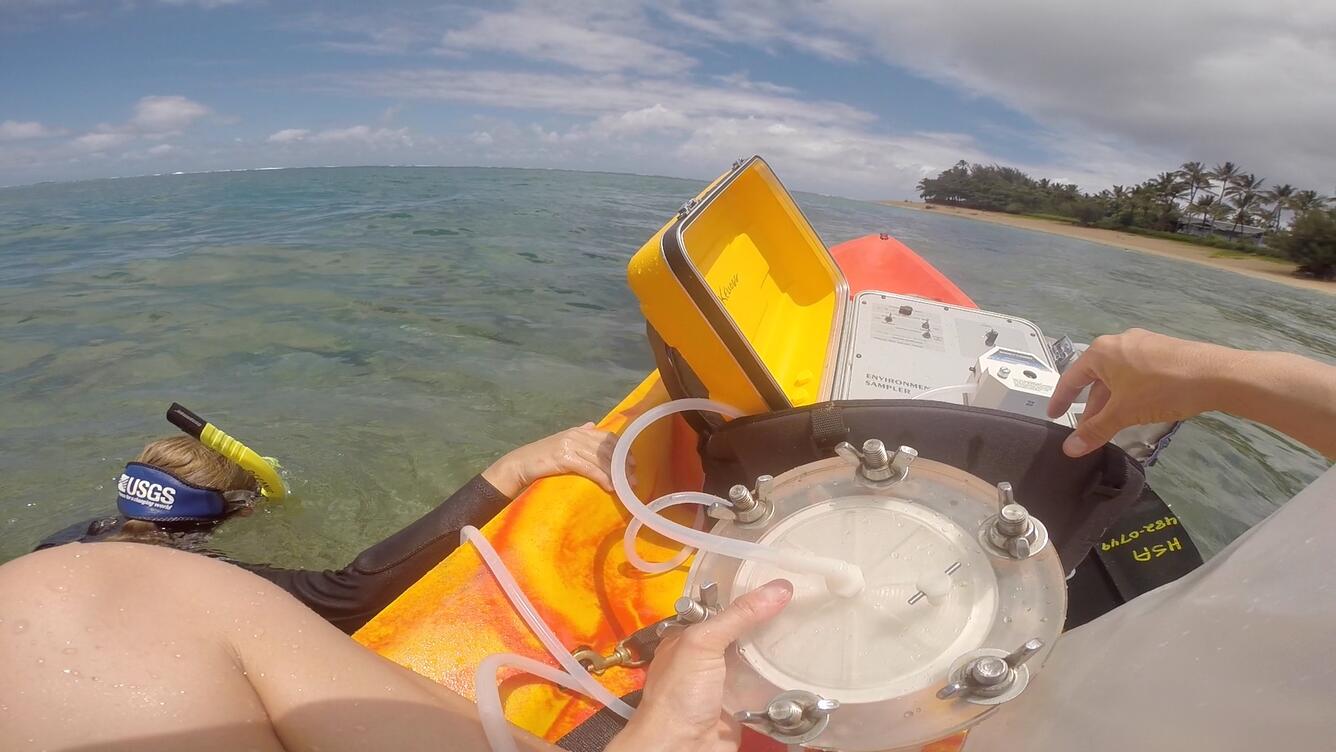Microbial Processes on Reefs
The microbial community on coral reefs is generally underappreciated given the ubiquity, abundance, complexity, and formative role these prokaryotes serve in the metabolic and chemical processes on reefs. We use microbiological and metagenomic techniques to decipher the roles the microbial community are playing in processes such as coral disease, submarine groundwater discharge, calcification, and dissolution.
Coral diseases were first reported on reefs in the Florida Keys and Caribbean in the 1970s, and
in the decades since, they have been reported worldwide and with increasing frequency. Disease is now recognized as one of the major causes of reef degradation and coral mortality, and a recent outbreak of “Stony Coral Tissue Loss Disease (SCTLD)” has decimated millions of corals on the Florida reef tract that is now progressing through other U.S. jurisdictions in the Caribbean region. Recent research has suggested that coral diseases may be secondary opportunistic infections, rather than the result of primary pathogens, making it imperative to understand the microbial shifts that accompany the transition from healthy to diseased corals (Kellogg and others, 2013; Kellogg and others, 2014). Additionally, we need to determine if the spread of coral disease is affected by the level of connectivity among water masses, organisms, trophic levels, or habitats.
Metagenomics is the study of all microbial genes (taxonomic and functional) within a particular host or habitat. Metagenomic techniques uncover both “who is there” and some level of “what they are doing” by comparing sequenced genes against databases of knowns. This is an emerging field and these techniques have only begun to be applied to coral reef environments. We will combine metadata such as water quality indicators, nutrients, microbial load, and carbonate system parameters with the power of metagenomics to investigate correlations between certain environmental states (e.g., patterns of total alkalinity) and particular microbial groups or microbially-mediated biogeochemical processes to describe the biochemical differences between degraded and healthy reefs.
The results will uncover changes in metabolic processes (via functional genes) between healthy and senescent reefs with the goal of uncovering new drivers of reef metabolism.


Below are other science projects associated with this project.
Coral Microbial Ecology
Coral Reef Ecosystem Studies (CREST)
Reef History and Climate Change
Holocene Coral-Reef Development
Coral Reef Seafloor Erosion and Coastal Hazards
Measuring Coral Growth to Help Restore Reefs
Below are publications associated with this project.
Seasonal microbial and environmental parameters at Crocker Reef, Florida Keys, 2014–2015 Seasonal microbial and environmental parameters at Crocker Reef, Florida Keys, 2014–2015
Comparing bacterial community composition of healthy and dark spot-affected Siderastrea siderea in Florida and the Caribbean Comparing bacterial community composition of healthy and dark spot-affected Siderastrea siderea in Florida and the Caribbean
Comparing bacterial community composition between healthy and white plague-like disease states in Orbicella annularis using PhyloChip™ G3 microarrays Comparing bacterial community composition between healthy and white plague-like disease states in Orbicella annularis using PhyloChip™ G3 microarrays
The microbial community on coral reefs is generally underappreciated given the ubiquity, abundance, complexity, and formative role these prokaryotes serve in the metabolic and chemical processes on reefs. We use microbiological and metagenomic techniques to decipher the roles the microbial community are playing in processes such as coral disease, submarine groundwater discharge, calcification, and dissolution.
Coral diseases were first reported on reefs in the Florida Keys and Caribbean in the 1970s, and
in the decades since, they have been reported worldwide and with increasing frequency. Disease is now recognized as one of the major causes of reef degradation and coral mortality, and a recent outbreak of “Stony Coral Tissue Loss Disease (SCTLD)” has decimated millions of corals on the Florida reef tract that is now progressing through other U.S. jurisdictions in the Caribbean region. Recent research has suggested that coral diseases may be secondary opportunistic infections, rather than the result of primary pathogens, making it imperative to understand the microbial shifts that accompany the transition from healthy to diseased corals (Kellogg and others, 2013; Kellogg and others, 2014). Additionally, we need to determine if the spread of coral disease is affected by the level of connectivity among water masses, organisms, trophic levels, or habitats.
Metagenomics is the study of all microbial genes (taxonomic and functional) within a particular host or habitat. Metagenomic techniques uncover both “who is there” and some level of “what they are doing” by comparing sequenced genes against databases of knowns. This is an emerging field and these techniques have only begun to be applied to coral reef environments. We will combine metadata such as water quality indicators, nutrients, microbial load, and carbonate system parameters with the power of metagenomics to investigate correlations between certain environmental states (e.g., patterns of total alkalinity) and particular microbial groups or microbially-mediated biogeochemical processes to describe the biochemical differences between degraded and healthy reefs.
The results will uncover changes in metabolic processes (via functional genes) between healthy and senescent reefs with the goal of uncovering new drivers of reef metabolism.


Below are other science projects associated with this project.
Coral Microbial Ecology
Coral Reef Ecosystem Studies (CREST)
Reef History and Climate Change
Holocene Coral-Reef Development
Coral Reef Seafloor Erosion and Coastal Hazards
Measuring Coral Growth to Help Restore Reefs
Below are publications associated with this project.





















